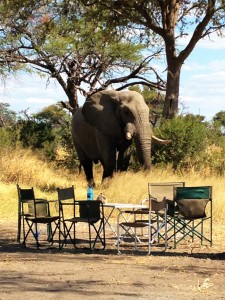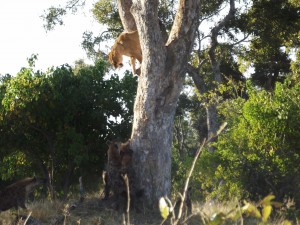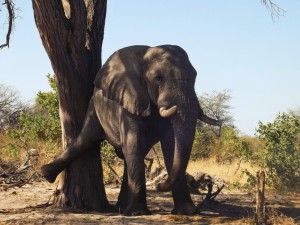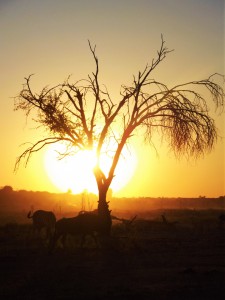
Helen Shaw in Botswana
April 29, 2016
First impressions of life as an elephant researcher – by Gape
August 2, 2016First impressions in camp from Hayley
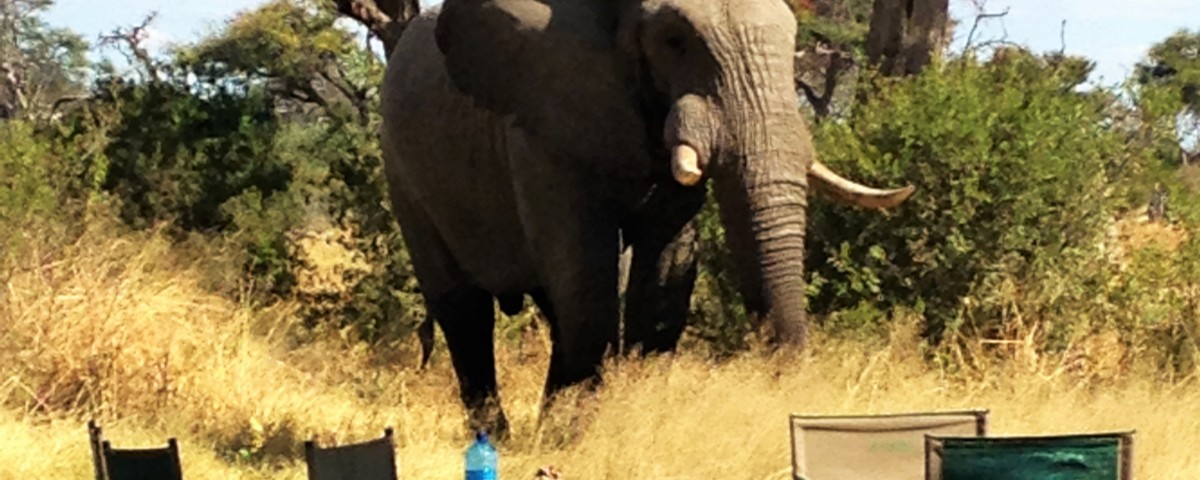
Close to camp.....
After what felt like months of preparation, excitement and trepidation I finally arrived in Botswana! The current members of the Elephants for Africa (EfA) team had planned a few days away from camp to visit the Khwai Community Concession, in between Moremi Game Reserve and Chobe National Park, and had asked if I would like to join them. They had warned me that it may be somewhat a “baptism of fire”, but I jumped at the chance to see another area of Botswana and all the incredible wildlife that it has to offer.
Our camp, on the banks of the Khwai River, was about as basic as you can get – no electricity, running water, toilets, showers or phone signal. Nor was there a fence to separate us from Khwai’s non-human inhabitants. Just a small tent each, a campfire to cook on and the modest supplies we had brought with us. The feeling of being truly “wild”, away from life’s modern day luxuries, was thrilling. For me, a stark reminder of just how exposed we were came early one afternoon, when a fairly large, male elephant casually strolled into camp, right past where we had been sitting moments before!
I cannot even begin to describe all of the amazing sights from our trip. However, a definite highlight was seeing a lioness hunting a herd of zebra on our last day. After a brief chase the lioness sunk her teeth and claws into the hindquarters of one unlucky individual, but the zebra remained on its feet and escaped, injured but alive. Events then took an unexpected turn when the hunter became the hunted. To our disbelief, the lioness was pursued by a clan of spotted hyena, and was forced to climb a tree to evade them. We watched, enthralled, as she perched precariously in the fork of the tree, whilst the hyenas leapt up at her, snapping at her heels and cackling.
It’s not just the exhilarating, heart-stopping moments that will stay with me though. Sitting by the side of a beautiful watering hole, cold drink in hand, watching the stunning sunset, whilst hippos grumble and snort mere metres away, elephants slowly wander past grazing on the vegetation and lions roar in the distance, is an experience I will never forget. The trip was also a great way for me to get to know the rest of the EfA team and served as a whirlwind introduction to the harsh but magnificent beauty of Botswana and its wildlife. But all too soon it was time for us to leave Khwai and head for the Makgadikgadi Pans National Park and the EfA camp; my home for the next year.
Compared to my lodgings for my first few nights in Botswana the EfA camp seemed luxurious! I was shown around the main building, which consists of an office, storage area and kitchen. Power is supplied via the solar panels on the roof and although there is no running water inside the building, a tap outside provides fresh water from a bore hole deep underground. Behind the main building is a shady seating area which overlooks the Boteti River, and a separate building houses the toilet and shower, whilst large, canvas safari tents serve as bedrooms.
One thing that both camps do have in common, however, is the lack of a fence. The EfA camp is situated inside the national park and as such a whole array of wildlife are free to come and go as they please, day or night. I don’t think I will ever get used to the thrill of lying in bed listening to elephants shaking the trees behind the tents in order to munch on the fallen Terminalia pods, or being awoken by the sound of impala rutting, which sounds uncannily like pigs snorting. During the day vervet monkeys jump and play on the roof of the office, which can be a little distracting when you are trying to work, and by night I often hear small snuffling and scratching noises as unidentified animals shuffle around the outside of my tent.
I very quickly began to settle in and feel at home in camp. But no matter how homely it feels, there are always improvements to be made. In the few short weeks that I have been here we have been busy building a new bucket shower with hot water from a geyser. The shower in the ablution block only has cold water, which is bracing to say the least in the chilly African winter mornings and evenings, so this has come as a very welcome addition. We have also been continuing with the ongoing task of building a shade-net canopy above each tent.
Nevertheless, the reason I came to Botswana is not to spend time in camp. I came to experience the wonders of the Makgadikgadi, to learn more about its incredible population of elephants, and contribute to the work of EfA – and so far I have certainly had ample opportunities to do all of these things. Initially I spent a lot of time going out on research sessions with Aaron and Helen, the two research assistants who have been working for EfA for the past 12 months, as well as my fellow research assistant for the next year, Masego, who arrived in camp a week after myself. Alongside project manager Jess, they have been teaching us all of the methods and techniques we will need to continue EfA’s long term elephant data collection, as well as introducing us to the other education and community aspects of EfA’s work in this area.
Eventually the time came for Helen and Aaron to return to the UK, so now it is up to Masego and I to carry on their hard work for the next year. They have both achieved an incredible amount during their time spent working in the Makgadikgadi, and I feel like we have a lot to live up to, but I am looking forward to making my own contribution to EfA’s research and education work. In the month that I have been here I have already learnt so much, but I know I still have a lot to learn. No two days are the same; each day brings new experiences, challenges and opportunities and I aim to make the most of every one of them.
From what I have seen so far I am in for a very interesting year. So much is changing in the Makgadikgadi. Some changes are predictable; currently you cannot fail to notice the ever growing numbers of zebra and wildebeest found along the river, as they reach their final destination after their yearly migration from the salt pans. However, other changes are less foreseeable. After two particularly dry years in Botswana the water level of the Boteti River is starting to look worryingly low. Usually at this time of year flood water from the Okavango Delta flows southward, filling the Boteti’s channel and providing much needed respite for wildlife during the dry season. This year the flood waters have yet to reach us, and it is looking increasingly likely that they may never arrive. If this is the case, we will have to keep a close eye on the effect this will have on the elephants and other wildlife in the national park.
There are, however, some more positive changes. EfA have a number of new projects and exciting collaborations in the pipeline, and I cannot wait to get stuck in and see them progress. Every day I still marvel at how unbelievably lucky I am to be living in such a beautiful national park, studying such intelligent, interesting and often entertaining animals. I have no doubt that there will be some hard work and challenging times ahead, but I am sure this will be outweighed by the many good times and the immense joy they bring. After all, when you love the work you are doing it never really feels like hard work. So for now I am just going to enjoy the ride, and am excited to find out what the next year has in store for me. Watch this space!
Hayley

